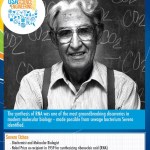Uncategorized
The Cult of Lego is a thing ... a cult ... a past time, a cultural phenomenon. But it is also a book called, as you might guess, The Cult of LEGO.
The book is written by John Baichtal, of Make Magazine and Wired GeekDad blog and Joe Meno, the founder of Brick Journal. The publishers describe the book thusly: "The Cult of LEGO® takes you on a thrilling illustrated tour of the LEGO community and its creations. You'll meet LEGO fans from all walks of life, like professional artist Nathan Sawaya, brick filmmaker David Pagano, the enigmatic Ego Leonard, and the many devoted AFOLs (adult fans…
Every once in a while a review copy of a book comes over the transom and it just makes your day. Nothing else that could happen is going to put a damper on the bright sunny mood that springs from such a happy moment.
One that arrived a few days ago that I can wait to read is Lance Fortnow's The Golden Ticket: P, NP, and the Search for the Impossible. Now that made my day! It's definitely next in line for reading.
A few months ago the book that definitely made such an impact when it arrived was Steve White's Dinosaur Art: The World's Greatest Paleoart. It immediately jumped out as an…
I hear they keep them on leashes so they don't rush into the audience and kill innocent bystanders.
Obama promised to eliminate left over random nuclear stuff that could be used to build either "clean" or "dirty" bombs, material that was distributed among several countries, by the end of this year (2013). We have yet to see if that task can be completed, but apparently it is on schedule.
Now, we have to get the Republicans to do the right thing and agree to the trimming down of our nuclear arsenal. That is actually more likely than it sounds. Here are all the details:
Visit NBCNews.com for breaking news, world news, and news about the economy
Why was the Civil War fought?
This is "Confederate Heritage and History Month" so it is a good time to talk about the Civil War. The Civil War was fought over slavery. I don't have anything else to say about that right now, but my friend John McKay has written a lengthy blog post explaining this. Have a look: It's Treason Appreciation Month
I had not intended for this to be such a chess heavy week, but here's a brief, but informative, essay on the history of the design of chess pieces:
Prior to 1849, there was no such thing as a “normal chess set.” At least not like we think of it today. Over the centuries that chess had been played, innumerable varieties of sets of pieces were created, with regional differences in designation and appearance. As the game proliferated throughout southern Europe in the early 11th century, the rules began to evolve, the movement of the pieces were formalized, and the pieces themselves were…
Science
- There's a new flu strain running around in China. As is often the case, Maryn McKenna over at Wired has the most important piece to read.
- Allie Wilkinson's piece in Ars Technica about a climate change's irreversibility, but not inevitability... it's a weird distinction, but it makes sense.
- Another good post from Keith Kloor on GMOs, but I'm not a fan of equating Monsanto with GMOs. One is a company, the other is a technology. Just because the technology is used by the company, that does not imply that the two are related.
Not Science
- The most important video I've seen in a…
A couple of years back, the The Crossley ID Guide for Eastern Birds came out and it caused a huge splash in the birdwatching world. For some time now it has become apparent that bird watching, especially the identification part of it, was changing in its approach. We describe it this way, though I think the reality is more complex: In the old days we used logical links to known reliable field marks to turn carefully made field observations into species identifications of varying degrees of certainty. Now, a new approach has been developed where we look at the whole bird and get an…
Just a quick post today, so have a look at this essay by Alex Beresow, over at Real Clear Science. He is advocating for chess to be a required subject in schools:
In the above video, the math/chess teacher says, “Chess trains logical thinking. It teaches how to make decisions, trains memory, strengthens will power, motivates children to win and teaches them how to deal with defeat. It's the only school subject that can do all this.”
That is a very interesting insight. Not only does chess help train the brain, but it also teaches children basic life skills. In our culture, we hand out…
It would be a serious dereliction of my bloggily duties if I did not comment on the big Candidates Tournament, recently concluded in London.
My comment is this: Wowee wow wow! What a great tournament!
This was the tournament meant to determine the next challenger for the current World Chess Champion, Viswanathan Anand of India. The participants were eight giants of the chess world, who qualified for the tournament in various ways. Going in, virtually everyone would have picked Magnus Carlsen, of Norway, as the clear favorite. Levon Aronian and Vladimir Kramnik were also plausible winners…
We are excited to announce that Dr. Mary Cleave will be serving as a Nifty Fifty Speaker for the Festival!
Long considered a role model in science and space exploration for her achievements, Mary is the recipient of various honors, including being the recipient of the American Astronautical Society Flight Achievement Award (1989); NASA Exceptional Achievement Medal (1994), and being profiled with Sally Ride, Anna Fisher and other U.S. women astronauts in the Women In Space DVD, and The Women's Adventures in Science book series.
Our Nifty Fifty Program has tripled in…
Via Massimo Pigliucci, I just read Gary Gutting's defense of his Catholic faith. Here's the opening:
An old friend and mentor of mine, Ernan McMullin, was a philosopher of science widely respected in his discipline. He was also a Catholic priest. I don’t know how many times fellow philosophers at professional meetings drew me aside and asked, “Does Ernan really believe that stuff?” (He did.) Amid all the serious and generally respectful coverage of the papal resignation and the election of a new pope, I often detect an undertone of this same puzzlement. Can reflective and honest…
Celebrating Role Models in Science & Achievement!
Biochemist and molecular biologist Severo Ochoa is best known for sharing the 1959 Nobel Prize in Physiology or Medicine with American biochemist Arthur Kornberg for discovering a bacterial enzyme that enabled him to synthesize RNA (ribonucleic acid).
To read his full biography and other STEM Role Models click here.
Looks like I've just added Ian McEwan's new novel to my reading list:
During one of their Brighton rendezvouses, after a round of oysters and a second bottle of champagne, Tom Haley asks Serena Frome the question every mathematician longs for her lover to utter:
I want you to tell me something...something interesting, no, counterintuitive, paradoxical. You owe me a good maths story.
Frome (“rhymes with plume”), a twenty-something blonde blessed with the looks of Scarlett Johansson might be the last person one would expect capable of satisfying Haley's request. But readers of Booker-winning…
Why is the sky blue? It's a classic question - probably the classic question of the genre of explanatory popular physics. The famous short version of the answer is that Rayleigh scattering by air molecules affects short-waveength light more than long-wavelength light, and so blue light tends to get scattered in random directions to create the diffuse blue we know and love. But like almost every answer physics can give, the answer leads to more questions. Why does Rayleigh scattering scatter short-wavelength light more strongly? This is a fairly involved question to answer from first…
The current Wikipedia entry for Climate Change has about 7000 words on that one page (including notes, all the other words that show up on Wikipedia pages). The current Wikipedia entry for the Hockey Stick Controversy has about 25,000 words in all.
The controversy over one aspect of climate change, the basic observation of temperature change known as the hockey stick graph, is certainly not more complex than, more important than, or harder to explain than climate change as a whole. Is this a failing of Wikipedia? A success for the Climate Science Deniers who are also hoping to have the…
Skeptically Speaking has this:
This week. we’re looking at what science has to say about the origins of selfless – and even self-sacrificing – behavior. We’ll speak to biology professor Lee Alan Dugatkin, about his book The Altruism Equation: Seven Scientists Search for the Origins of Goodness. And we’ll discuss altruism from a neurological perspective, with Duke University Neuroscientist Steve Chang, whose research in monkeys looks at how their brains process and record helpful inclinations.
Get the podcast here.
Let me wrap up the week's blogging by directing you to two essays related to things we've been discussing this week.
The first is Mohan Matthen's review of Thomas Nagel's book in The Philosopher's Magazine. I refer you to it partly because it's an interesting essay in its own right, but also because he seizes on precisely the Nagel quote that caught my attention in this post. Matthen writes:
This is perhaps the moment to come back to the strange pronouncement to which I earlier alluded. Nagel writes, “With regard to evolution, the process of natural selection cannot account for the actual…





